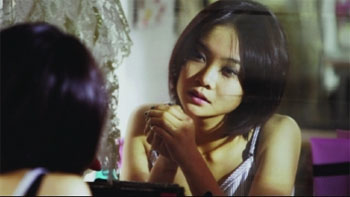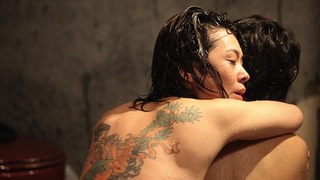When Love Comes (2010, Dir. Chang Tso-chi):
The family drama may be a staple of cinema the world over, but thanks to the likes of director Edward Yang and his descendants, Taiwan has carved out its own niche of carefully observed, underplayed dramas. Those used to catharsis and big, juicy showdowns between messed-up parents and wayward youths will find little to appreciate; those who enjoy the quieter dynamics of family rituals, and the slippage between expectations and reality, will find them right in their wheelhouse.
 So it is with Chang Tso Chi’s When Love Comes, which pretty much swept the Golden Horse Awards (Taiwan’s version of the Oscars) last year. The first scene sets the film’s mood and strategy: we’re thrust straight into the hubbub of a restaurant buried in a local Taipei shopping arcade, all scantily-clad waitresses, old ladies chatting, local gangs hanging out. Questing about, the camera lights briefly on 16-year-old Lai Chun (Lee Yi-chieh), who is strangely estranged from all the activity around her — it’s clear that she has no interest in this world, nor love for it. Before we can even ask the who or why, a very pregnant woman collapses and gives birth on the spot. Bang, opening credits, explanations forthcoming.
So it is with Chang Tso Chi’s When Love Comes, which pretty much swept the Golden Horse Awards (Taiwan’s version of the Oscars) last year. The first scene sets the film’s mood and strategy: we’re thrust straight into the hubbub of a restaurant buried in a local Taipei shopping arcade, all scantily-clad waitresses, old ladies chatting, local gangs hanging out. Questing about, the camera lights briefly on 16-year-old Lai Chun (Lee Yi-chieh), who is strangely estranged from all the activity around her — it’s clear that she has no interest in this world, nor love for it. Before we can even ask the who or why, a very pregnant woman collapses and gives birth on the spot. Bang, opening credits, explanations forthcoming.
The rest of the movie is spent slowly unpacking the relationships between all the folks in that whirligig opening, and our position mirrors that of Lai Chun, who initially prefers to spend her time cracking sex jokes with her female classmates and having flings with bad boys to getting to know the members of her immediate family. What is revealed is an unusual parental structure in which she has two mother figures, the shrewish Xuefang (Lü Hsueh-feng), who runs the family restaurant, and Zihua (Ho Tzu-hua), the quiet woman who gave birth in the opening scene. Caught between them is “Dark Face” (Lin Yu-shun), Hsueh-feng’s roly-poly husband, a man whose moods perfectly match his nickname. Saddled with his mentally retarded younger brother Jie (Kao Meng-chieh), reduced to boozing it up with his buddies and bashing away at the drums while singing a gallows song titled “Spouse” (“When you’re old enough I’ll give you the rope to hang yourself”), this is a man full of sound and fury who is perilously close to signifying nothing. Faced with such a cacophonous household, it’s small wonder that Lai Chun shuns their company, especially when they forget her 16th birthday, and favors the more exciting attentions of a local motorcycle tough (Wu Jang-jen).
 “I like the feeling of sunlight — but it’s always dark here.”
“I like the feeling of sunlight — but it’s always dark here.”
— Lai Chun, When Love Comes
Of course it wouldn’t be a family drama without the drama, which comes when Lai Chun gets pregnant and her boyfriend promptly ditches her, leaving her to the mercy of her family unit. With the exception of her kindly grandfather (Wei Jen-ching), no one takes it well, and it seems that all her preconceptions of her brood have been confirmed in the worst way — and then the world turns, revelations and further tragedies occur, and slowly these characters gain extra dimensions. Suffice to say that there’s a lot more to the quiet Zihua than first imagined, as illustrated by a scene where she neatly punctures the punk-ass bravado between two quarreling gangs in the restaurant, and it turns out that even the tough-minded Xuefang has a breaking point, while Dark Face betrays his humanity when the family takes a trip to its hometown on Kinmen Island. The primary message behind all this is that life may continually surprise and even disappoint, but it goes on, and by the end Lai Chun is a beatific, expectant mother — while her ultimate transformation is sudden and a bit pat (it doesn’t help that it’s accompanied by an overemphatic cello-and-piano soundtrack), Lee Yi-chieh sells it, suggesting reserves of strength behind her cute facade.
When Love Comes is probably Chang Tso-chi’s most straightforward film yet — less knotty and despairing than his earlier Ah- Chung (1996) and The Best of Times (2000), it nevertheless shares some of the narrative meanderings of his other works; several plotlines trail off into dead ends or are never resolved (Dark Face and Jie are presented for an opportunity for rapprochement that never materializes, for example). Unlike those other films, this one ends on a resolutely positive note, as we circle back to the opening shots, and another birth takes place in the crowded shopping arcade. Despite the grimness of much of the goings-on, there’s a puckishness to Chang’s humor, as in a scene where we witness Lai Chun appearing to jump off her balcony in a suicide attempt — only to discover she’s merely landed on the same floor, on the other side of the railing. There’s some striking cinematography as well, such as a climactic moment where Lai Chun walks alone through a lonely beachside town while a happy couple frolic just past the outskirts of her (and the camera’s) vision. Is it her old boyfriend with his new flame? Chang’s cunning framing indicates that Lai Chun is past the point of caring.
 When Love Comes is polished and well-acted, certainly award-worthy bait, Golden Horses or otherwise — but is it worthy of comparisons to Edward Yang? Once you remove Chang’s sure directorial touch and his narrative trick of revealing the character interrelationships bit by bit, what you have is a sturdy family drama, nothing more, nothing less. Compare that to Edward Yang’s Brighter Summer’s Day and Yi Yi, in which the tumult of an entire society as well as a single family is laid bare; Lai Chun’s progression from wayward daughter to maturing young woman is convincing enough, but what the film lacks is a touch of ineffability that informs the best dramas, the sense that everything that happens is vitally important, and couldn’t happen to anyone else at any other time. Perhaps it’s unfair to place the burden of the masters on Chang — When Love Comes certainly holds its own as solid moviemaking, even if it might not persist in the memory. Think of it as a family photo, a single moment in time captured, as opposed to a family heirloom with whole reservoirs of history contained within.]]>
When Love Comes is polished and well-acted, certainly award-worthy bait, Golden Horses or otherwise — but is it worthy of comparisons to Edward Yang? Once you remove Chang’s sure directorial touch and his narrative trick of revealing the character interrelationships bit by bit, what you have is a sturdy family drama, nothing more, nothing less. Compare that to Edward Yang’s Brighter Summer’s Day and Yi Yi, in which the tumult of an entire society as well as a single family is laid bare; Lai Chun’s progression from wayward daughter to maturing young woman is convincing enough, but what the film lacks is a touch of ineffability that informs the best dramas, the sense that everything that happens is vitally important, and couldn’t happen to anyone else at any other time. Perhaps it’s unfair to place the burden of the masters on Chang — When Love Comes certainly holds its own as solid moviemaking, even if it might not persist in the memory. Think of it as a family photo, a single moment in time captured, as opposed to a family heirloom with whole reservoirs of history contained within.]]>





